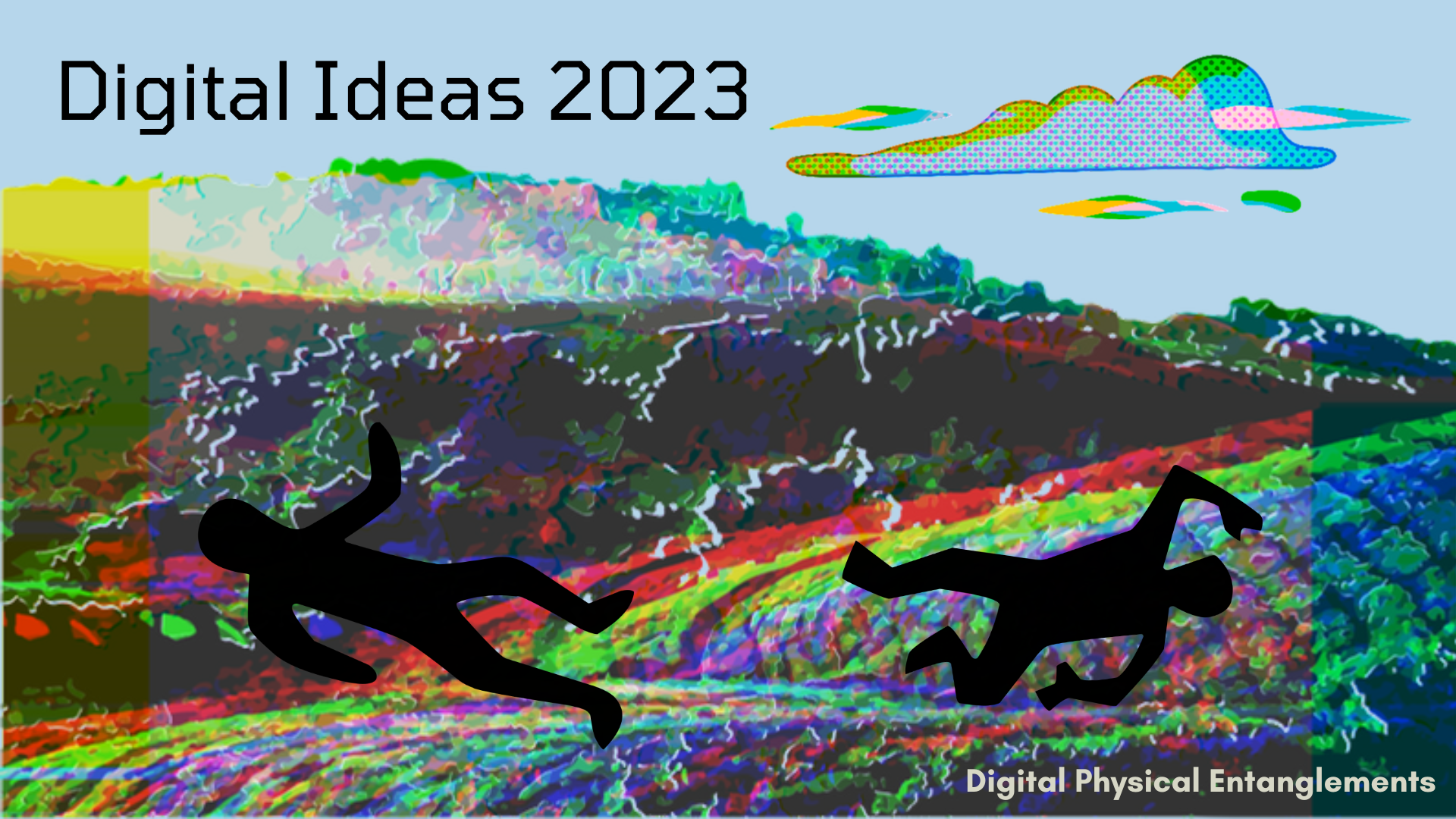Digital IDEAS 2023 Recap
by Giselle Mills
In July of 2023, the third annual Digital IDEAS Summer Institute commenced. This year’s theme, Digital Physical Entanglements: Environments, Bodies, and Space addressed the intertwining relations between digital and physical realms. If at one time digital space was understood to be distinctly separate from the physical, scholarship over the past decade has sought to reframe and reexamine the exchanges and mutual transformations of environments, bodies, and spaces. Digital IDEAS built on this work, investigating sustainability, infrastructure, resource limitation, and emerging forms of embodiment. The hybrid Summer Institute brought together more than fifty academics and artists from universities and institutions all over the country, as well as from Canada, Chile, Germany, and South Korea. Over the course of two weeks, participants heard from scholars, faculty, and artists about their research and experiences in their field, participated in methods workshops, met with one another in small research groups, joined speaker and faculty office hours, ate lots of good food, and made new, enlightening connections.
At the end of the two weeks, Digital IDEAS Program Assistant Giselle Mills asked the cohort a series of questions. [Responses have been edited and condensed for clarity.]
What was your favorite part of Week 1/Week 2/Digital IDEAS as a whole?
Jasmine Banks, Doctoral Candidate in Psychology at the University of Michigan: My favorite part of IDEAS as a whole was the type of safe, supportive and intellectually stimulating environment both online and in person. These two weeks allowed me to share my research and get great feedback while also learning from experts in the field.
Rosa Calosso, Doctoral Candidate in Urban Education at the CUNY Graduate Center: My favorite part was participating in the program in-person during the second week. I enjoyed meeting, engaging, co-working, and breaking bread with folks across different disciplines.
Angelica Martinez-Ochoa, Doctoral Candidate in Arts, Technology, and Emerging Communications at the University of Texas: Undoubtedly, the most cherished part of my experience with Digital IDEAS was during the second week, where I had the incredible opportunity to attend in person. Gathered around round tables, we engaged in both group discussions and intimate one-on-one conversations each day, enriching the entire experience.
What were you hoping to learn or get out of Digital IDEAS?
Jasmine Banks: Like many others, I had no idea what to expect. I went in with an open mind and I'm glad I did. I learned things I didn't even know I wanted or needed in my wheelhouse.
Sarah Sgro, Doctoral Candidate in English at the University of Buffalo: Having fairly recently expanded my focus on poetics to include digital studies, I was hoping to learn from and meaningfully connect with a dynamic, diverse community invested in wide-ranging approaches to the digital. I returned home with a brain and notebook full of compelling insights and experiences, renewed confidence in my own work, as well as a number of new friends who I look forward to reconnecting with at events such as SCMS and beyond.
What is the most valuable thing that you have learned or taken away from the conference?
Rosa Calosso: I truly appreciate the intentionality of the institute’s programming. It was student/participant-centered, valued our time and needs, and more importantly cared about our mental and physical capacity.
Angelica Martinez-Ochoa: In essence, the summer institute was an immense source of inspiration. It gifted me with the precious time and space to reflect deeply on my research from fresh perspectives. This pause was a much-needed breath amidst the midst of my dissertation journey, and I emerged from it with renewed energy and clarity.
How do you think Digital IDEAS will impact your research, methodology, or pedagogy?
Jasmine Banks: I left IDEAS with a new perspective on my own research and new ways to collaborate with academics, artists and activists. It allowed me to build a community of folk who do similar research as mine; being in conversation with them during IDEAS will translate to being in a community with them outside of IDEAS. This space brought together scholars from all disciplines and regions and is a community I hope we are able to continue fostering.
Rosa Calosso: It gave me the opportunity to think about my research outside of my typical research-writing/processing ways. Mimi and Lisa challenged our traditional academic ways of thinking, processing, and troubleshooting our work. I truly appreciate that from them. Engaging with the artistic aspect—through drawing, archiving, collaging, and coding.
Angelica Martinez-Ochoa: My notes from the conference include a section I fondly named "IDEAS" – a collection of ideas that I embraced and am now actively pursuing. For instance, a colleague and I have just launched a call for participants in a workshop focusing on the exploration of the design practices and methods in the production of technologies for women in the FemTech industry. This idea was brewing before, but the inspiration gained from the conferences helped us refine the project's focus and align it more closely with my dissertation goals.
What was the most surprising thing you've learned, felt, or experienced during the conference?
Angelica Martinez-Ochoa: Michigan's campus and Ann Arbor itself proved to be uniquely captivating places. I shared this adventure with my baby, husband, and mom, and we were all amazed by the warmth and intelligence of the people in Ann Arbor and its surroundings.
Sarah Sgro: I'm still moved by the serendipity of meeting Sam McCracken, fellow cohort member and digital waste enthusiast who shares so many of my formative influences while guiding me towards a fresh treasure trove of trash texts. Sam is a remarkably kindred academic interlocutor and new close friend who I am excited to collaborate with on future conference panels, articles, and maybe even book projects!
Join us for the next Digital IDEAS Summer Institute, June 17-28, 2024!
